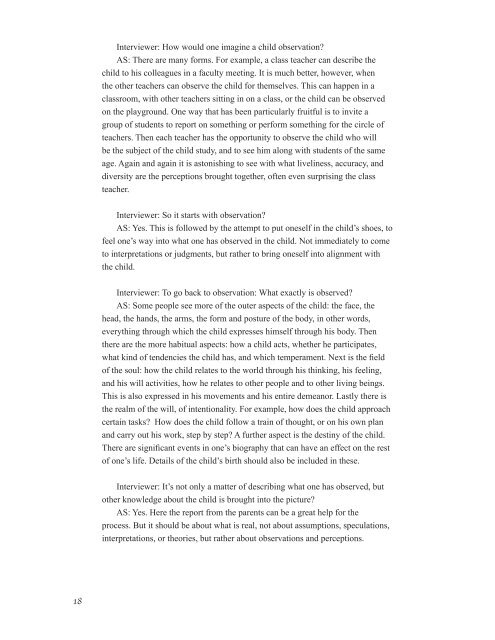Observing the Class Observing the Children - Research Institute for ...
Observing the Class Observing the Children - Research Institute for ...
Observing the Class Observing the Children - Research Institute for ...
Create successful ePaper yourself
Turn your PDF publications into a flip-book with our unique Google optimized e-Paper software.
18<br />
Interviewer: How would one imagine a child observation?<br />
AS: There are many <strong>for</strong>ms. For example, a class teacher can describe <strong>the</strong><br />
child to his colleagues in a faculty meeting. It is much better, however, when<br />
<strong>the</strong> o<strong>the</strong>r teachers can observe <strong>the</strong> child <strong>for</strong> <strong>the</strong>mselves. This can happen in a<br />
classroom, with o<strong>the</strong>r teachers sitting in on a class, or <strong>the</strong> child can be observed<br />
on <strong>the</strong> playground. One way that has been particularly fruitful is to invite a<br />
group of students to report on something or per<strong>for</strong>m something <strong>for</strong> <strong>the</strong> circle of<br />
teachers. Then each teacher has <strong>the</strong> opportunity to observe <strong>the</strong> child who will<br />
be <strong>the</strong> subject of <strong>the</strong> child study, and to see him along with students of <strong>the</strong> same<br />
age. Again and again it is astonishing to see with what liveliness, accuracy, and<br />
diversity are <strong>the</strong> perceptions brought toge<strong>the</strong>r, often even surprising <strong>the</strong> class<br />
teacher.<br />
Interviewer: So it starts with observation?<br />
AS: Yes. This is followed by <strong>the</strong> attempt to put oneself in <strong>the</strong> child’s shoes, to<br />
feel one’s way into what one has observed in <strong>the</strong> child. Not immediately to come<br />
to interpretations or judgments, but ra<strong>the</strong>r to bring oneself into alignment with<br />
<strong>the</strong> child.<br />
Interviewer: To go back to observation: What exactly is observed?<br />
AS: Some people see more of <strong>the</strong> outer aspects of <strong>the</strong> child: <strong>the</strong> face, <strong>the</strong><br />
head, <strong>the</strong> hands, <strong>the</strong> arms, <strong>the</strong> <strong>for</strong>m and posture of <strong>the</strong> body, in o<strong>the</strong>r words,<br />
everything through which <strong>the</strong> child expresses himself through his body. Then<br />
<strong>the</strong>re are <strong>the</strong> more habitual aspects: how a child acts, whe<strong>the</strong>r he participates,<br />
what kind of tendencies <strong>the</strong> child has, and which temperament. Next is <strong>the</strong> field<br />
of <strong>the</strong> soul: how <strong>the</strong> child relates to <strong>the</strong> world through his thinking, his feeling,<br />
and his will activities, how he relates to o<strong>the</strong>r people and to o<strong>the</strong>r living beings.<br />
This is also expressed in his movements and his entire demeanor. Lastly <strong>the</strong>re is<br />
<strong>the</strong> realm of <strong>the</strong> will, of intentionality. For example, how does <strong>the</strong> child approach<br />
certain tasks? How does <strong>the</strong> child follow a train of thought, or on his own plan<br />
and carry out his work, step by step? A fur<strong>the</strong>r aspect is <strong>the</strong> destiny of <strong>the</strong> child.<br />
There are significant events in one’s biography that can have an effect on <strong>the</strong> rest<br />
of one’s life. Details of <strong>the</strong> child’s birth should also be included in <strong>the</strong>se.<br />
Interviewer: It’s not only a matter of describing what one has observed, but<br />
o<strong>the</strong>r knowledge about <strong>the</strong> child is brought into <strong>the</strong> picture?<br />
AS: Yes. Here <strong>the</strong> report from <strong>the</strong> parents can be a great help <strong>for</strong> <strong>the</strong><br />
process. But it should be about what is real, not about assumptions, speculations,<br />
interpretations, or <strong>the</strong>ories, but ra<strong>the</strong>r about observations and perceptions.

















